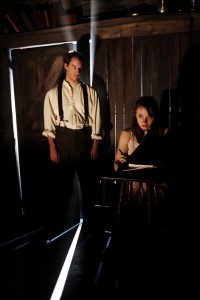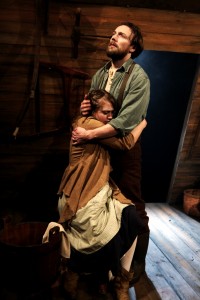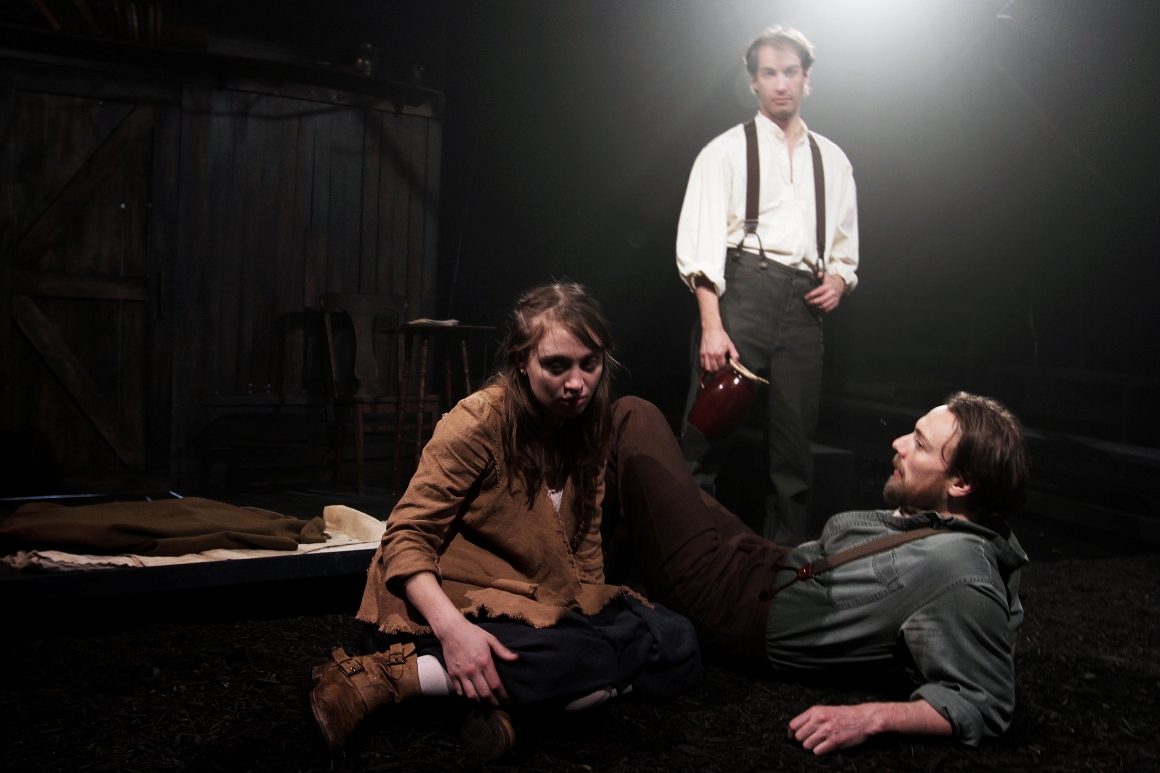
Ross Beschler’s Miller helps Emilie Krause’s Young Woman see the light in Theatre Exile’s KNIVES IN HENS. (Photo credit: Paola Nogueras)
The power of great art is that it can transport us to another time and place, and that’s exactly what Theatre Exile does with its inspired production of David Harrower’s KNIVES IN HENS. Thrust into a pre-industrialized world on the cusp of greater knowledge, we encounter a disquieting close-up of three archetypal characters–the Ploughman, Pony William; the Young Woman, his wife; and Gilbert Horn, the Miller–who personify the transition of humankind from elemental to cognizant.
Director Brenna Geffers’ unique vision of Harrower’s fable merges theater with art installation, placing the audience right in the midst of the action and environment. We don’t merely watch the play, we are immersed in it, on chairs and benches interspersed throughout Thom Weaver’s rustic scenic design, humid atmosphere, and evocative lighting. The intimate space of Studio X is transformed into a darkly mysterious rural setting that we inhabit alongside the characters, as crows caw, birds chirp, and horses neigh around us (courtesy of the excellent sound design by Christopher Colucci and Daniel Perelstein).
Harrower set KNIVES IN HENS (his first play, written in 1995) in an unspecified earlier time, when literacy was not the norm, and earthy physicality defined the lives of the common folk, who did little more than toil, eat, sleep, fight, and mate. But the script is complex and haunting; it is a playwright’s play, filled with starkly poetic language celebrating our evolution from ignorance to enlightenment, and the fundamental importance of the pen and the book–the two symbols that distinguish people from animals, and the learned Miller from the primal Ploughman. It is their mutual love of language that eventually unites the Miller with the Young Woman, in her quest for higher knowledge and liberating self-expression.

Emilie Krause and Jered McLenigan express the gritty physicality of their agrarian characters in Theatre Exile’s KNIVES IN HENS. (Photo credit: Paola Nogueras)
KNIVES IN HENS raises the ethical issue of what is justifiable to achieve personal growth, self-determination, and happiness. The Young Woman realizes the need for action, but the action she takes for her own sustenance becomes as violent as pushing a knife into a hen, and done with as little remorse. It leaves us to question the course of civilization, and at what cost progress?
These are demanding roles for actors, as the characters struggle with language, speak in staccato phrases, and grasp for the right words to explain themselves and the world around them. Rhythm is key, and the talented cast expressively captures the terse and halting speech, unrefined movements, and base eroticism of the peasants. Under Geffers’ nuanced direction, Jered McLenigan as the Ploughman is more vulgar, Ross Beschler as the Miller is less coarse and more articulate, and Emilie Krause develops from subservient to formidable with the Young Woman’s life-altering discoveries about her husband and herself.
The significations of KNIVES IN HENS are open to interpretation, and like all great art, Exile’s production provides provocative ideas for the audience to ponder, and to feel. It is a personalized theatrical experience unlike any other.
KNIVES IN HENS
by David Harrower
Directed by Brenna Geffers
February-March 4, 2012
Theatre Exile
Studio X
1340 South 13th Street
Philadelphia, PA 19147
215.218.4022
www.theatreexile.org

